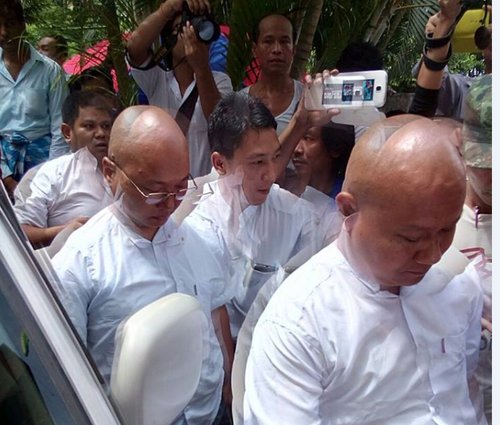The British embassy in Rangoon said it is providing legal assistance to the Buddhist monk Uttara, a British citizen, who was arrested and charged with religious offences following a night-time raid at a Rangoon monastery under a land ownership dispute.
Uttara, a Burma-born UK passport holder, along with four other monks – Paññāsara, Neindira, Tazeina and Sondrasiri – was detained in Insein prison following a 10 June raid by police and the government-backed State Sangha Maha Nayaka at the Mahasantisukha Monastery in Rangoon’s Tamwe Township.
The five were disrobed from the Buddhist monkhood, detained in Rangoon’s most infamous prison for more than a week, and charged under Article 295(a) of the Penal Code for defaming and insulting religion, an offence which carries a maximum sentence of two years’ imprisonment. They were also charged under the 1990 “Law Relating to the Sangha [Buddhist monkhood]” for insubordination and inciting mutiny against the monastic order. If found guilty, the five could face up to three years’ imprisonment on that charge alone.
[related]
Penang Sayadaw, a revered abbot who is custodian and self-proclaimed owner of the monastery in question, said the Mahasantisukha Monastery’s legal affairs committee had assigned a team of lawyers to defend the five monks.
Speaking to DVB on Thursday, the abbot hit out at the State Sangha Maha Nayaka.
“There’s something I would like to say to the Sanha Maha Nayaka. You might probably have heard their proclamation: ‘There’s no one above the order of Dharma’, meaning no one can sue them as they have decision-making power,” he said. “But the Lord Buddha, before his passing, told Ananda that his teachings, and the Vinaya he adopted, should be regarded as teachings and guidelines for the monastic order. Therefore the Sangha Maha Nayaka, by stating that they have decision-making power, is basically contradicting the teachings of Buddha.”
Aung Thein, a well-known Supreme Court lawyer, said the prosecution of the monks was not in line with the law.
“There were no legal grounds on which to prosecute the monks under Article 295(a) as they did not engage in any kind of activity and were simply staying at the monastery as guests of the Penang Sayadaw who is in charge of the venue,” he said.



